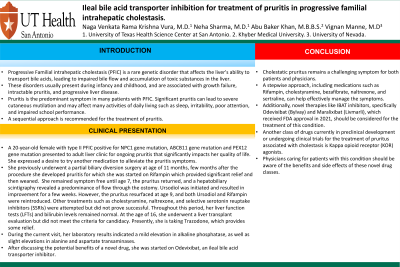Monday Poster Session
Category: Liver
P2593 - Ileal Bile Acid Transporter Inhibition for Treatment of Pruritis in Progressive Familial Intrahepatic Cholestasis
Monday, October 23, 2023
10:30 AM - 4:15 PM PT
Location: Exhibit Hall

Has Audio

Naga Venkata Rama Krishna Vura, MD
UTHSCSA
San Antonio, TX
Presenting Author(s)
Naga Venkata Rama Krishna Vura, MD1, Neha Sharma, MD1, Abu baker Khan, MBBS2, Vignan Manne, MD3
1UTHSCSA, San Antonio, TX; 2Khyber Medical University, Peshawar, Northern Areas, Pakistan; 3UNLV School of Medicine, Las Vegas, NV
Introduction: Progressive Familial intrahepatic cholestasis (PFIC) is a rare genetic disorder that affects the liver's ability to transport bile acids, leading to impaired bile flow and accumulation of toxic substances in the liver. Pruritis is the predominant symptom in many patients with PFIC. Significant pruritis can lead to severe cutaneous mutilation and may affect many activities of daily living, such as sleep, irritability, poor attention, and impaired school performance. A sequential approach is recommended for the treatment of pruritis.
Case Description/Methods: A 20-year-old female with type II PFIC positive for ABCB11 gene mutation presented to an adult liver clinic for ongoing pruritis, significantly impacting her quality of life. She expressed a desire to try another medication to alleviate the pruritis. She previously underwent a partial biliary diversion surgery at 11 months; a few months after the procedure, she developed pruritus, for which she was started on Rifampin which provided significant relief and then weaned. She remained symptom-free until age 7, the pruritus returned, and hepatobiliary scintigraphy revealed a predominance of flow through the ostomy. Ursodiol was initiated and resulted in improvement for a few weeks. However, the pruritus resurfaced at age 9, and both Ursodiol and Rifampin were reintroduced. Other treatments, such as cholestyramine, naltrexone, and selective serotonin reuptake inhibitors, were attempted but unsuccessful. Her liver function tests and bilirubin levels remained normal throughout this period. At 16, she underwent a liver transplant evaluation but did not meet the criteria for candidacy. Presently, she is taking Trazodone, which provides some relief. During the current visit, her laboratory results indicated a mild alkaline phosphatase, alanine, and aspartate transaminases elevation. After discussing the potential benefits of a novel drug, she was started on Odevixibat, an ileal bile acid transporter inhibitor.
Discussion: Cholestatic pruritus remains a challenging symptom for both patients and physicians. A stepwise approach, including medications such as Rifampin, cholestyramine, bezafibrate, naltrexone, and sertraline, can help effectively manage the symptoms. Additionally, novel therapies like IBAT inhibitors, specifically Odevixibat and Maralixibat, which received FDA approval in 2021, should be considered. Physicians caring for patients with this condition should be aware of these novel drug classes' benefits and side effects.
Disclosures:
Naga Venkata Rama Krishna Vura, MD1, Neha Sharma, MD1, Abu baker Khan, MBBS2, Vignan Manne, MD3. P2593 - Ileal Bile Acid Transporter Inhibition for Treatment of Pruritis in Progressive Familial Intrahepatic Cholestasis, ACG 2023 Annual Scientific Meeting Abstracts. Vancouver, BC, Canada: American College of Gastroenterology.
1UTHSCSA, San Antonio, TX; 2Khyber Medical University, Peshawar, Northern Areas, Pakistan; 3UNLV School of Medicine, Las Vegas, NV
Introduction: Progressive Familial intrahepatic cholestasis (PFIC) is a rare genetic disorder that affects the liver's ability to transport bile acids, leading to impaired bile flow and accumulation of toxic substances in the liver. Pruritis is the predominant symptom in many patients with PFIC. Significant pruritis can lead to severe cutaneous mutilation and may affect many activities of daily living, such as sleep, irritability, poor attention, and impaired school performance. A sequential approach is recommended for the treatment of pruritis.
Case Description/Methods: A 20-year-old female with type II PFIC positive for ABCB11 gene mutation presented to an adult liver clinic for ongoing pruritis, significantly impacting her quality of life. She expressed a desire to try another medication to alleviate the pruritis. She previously underwent a partial biliary diversion surgery at 11 months; a few months after the procedure, she developed pruritus, for which she was started on Rifampin which provided significant relief and then weaned. She remained symptom-free until age 7, the pruritus returned, and hepatobiliary scintigraphy revealed a predominance of flow through the ostomy. Ursodiol was initiated and resulted in improvement for a few weeks. However, the pruritus resurfaced at age 9, and both Ursodiol and Rifampin were reintroduced. Other treatments, such as cholestyramine, naltrexone, and selective serotonin reuptake inhibitors, were attempted but unsuccessful. Her liver function tests and bilirubin levels remained normal throughout this period. At 16, she underwent a liver transplant evaluation but did not meet the criteria for candidacy. Presently, she is taking Trazodone, which provides some relief. During the current visit, her laboratory results indicated a mild alkaline phosphatase, alanine, and aspartate transaminases elevation. After discussing the potential benefits of a novel drug, she was started on Odevixibat, an ileal bile acid transporter inhibitor.
Discussion: Cholestatic pruritus remains a challenging symptom for both patients and physicians. A stepwise approach, including medications such as Rifampin, cholestyramine, bezafibrate, naltrexone, and sertraline, can help effectively manage the symptoms. Additionally, novel therapies like IBAT inhibitors, specifically Odevixibat and Maralixibat, which received FDA approval in 2021, should be considered. Physicians caring for patients with this condition should be aware of these novel drug classes' benefits and side effects.
Disclosures:
Naga Venkata Rama Krishna Vura indicated no relevant financial relationships.
Neha Sharma indicated no relevant financial relationships.
Abu baker Khan indicated no relevant financial relationships.
Vignan Manne indicated no relevant financial relationships.
Naga Venkata Rama Krishna Vura, MD1, Neha Sharma, MD1, Abu baker Khan, MBBS2, Vignan Manne, MD3. P2593 - Ileal Bile Acid Transporter Inhibition for Treatment of Pruritis in Progressive Familial Intrahepatic Cholestasis, ACG 2023 Annual Scientific Meeting Abstracts. Vancouver, BC, Canada: American College of Gastroenterology.
